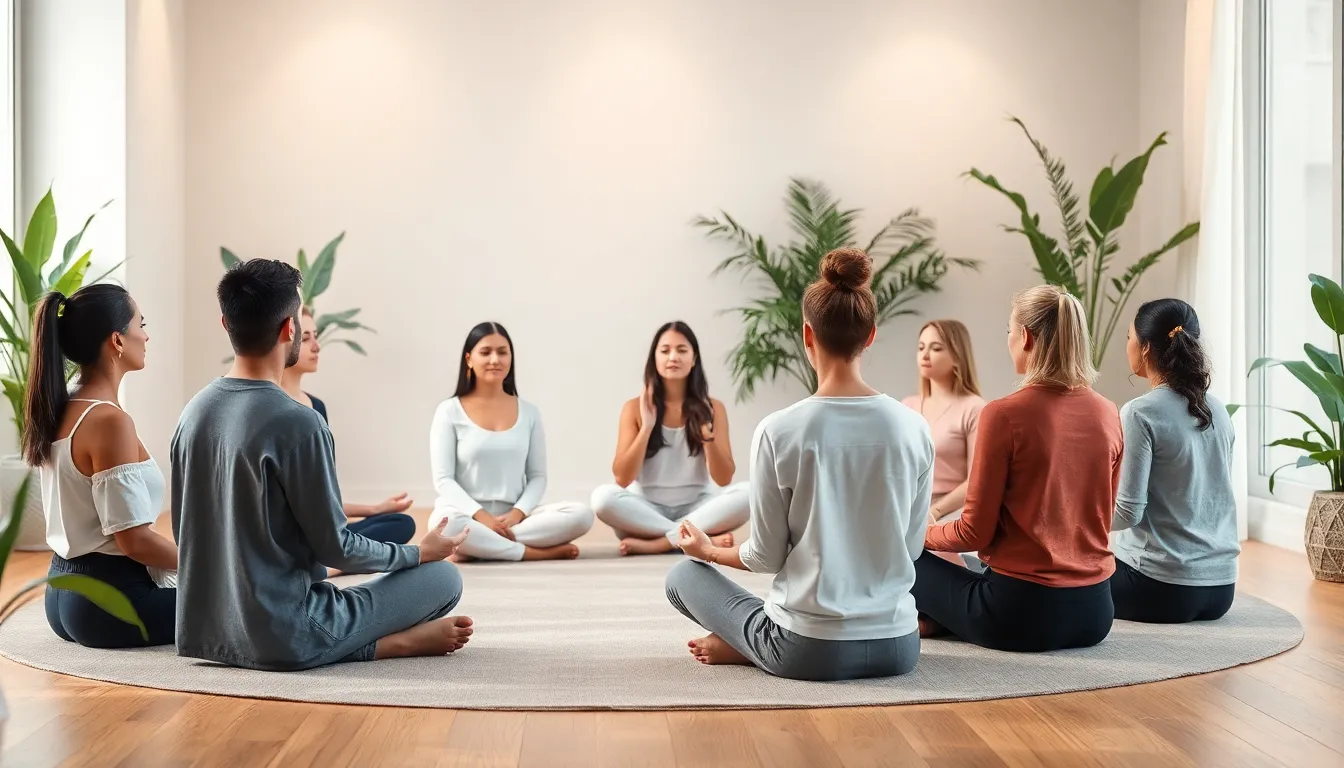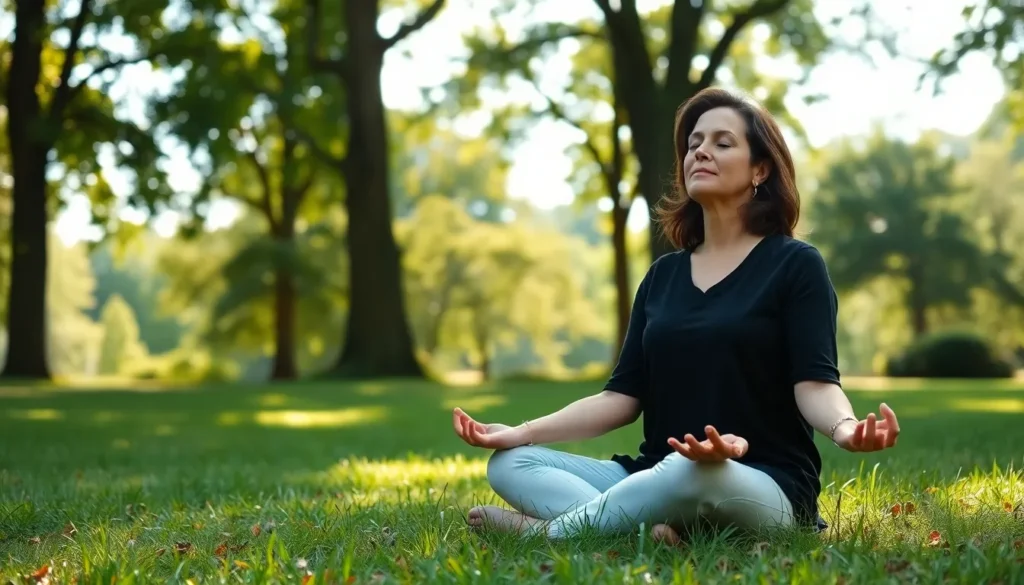In a world buzzing with distractions and deadlines, mindfulness has emerged as the superhero we never knew we needed. Think of it as your personal Zen master, ready to help you tackle stress like a pro while keeping your sanity intact. But what exactly are the skills that make mindfulness so magical?
Mastering mindfulness isn’t just about sitting cross-legged and chanting “Om.” It’s a treasure trove of practical skills that can transform everyday chaos into calm. From sharpening focus to enhancing emotional resilience, these skills are like the Swiss Army knife for mental well-being. So, if you’re ready to trade anxiety for tranquility and become the calm in the storm, let’s dive into the essential skills that’ll have you saying, “Namaste” to life’s challenges.
mindfulness what skills
Mindfulness encompasses various skills that enhance awareness and presence. Practitioners engage in techniques that cultivate attention to the present moment. These techniques include breath awareness, body scanning, and mindful observation. Breath awareness involves focusing on the rhythm of inhalation and exhalation to stabilize thoughts. Body scanning encourages individuals to connect with bodily sensations and identify areas of tension.
Mindful observation invites recognition of thoughts without judgment. This skill cultivates acceptance and reduces emotional reactivity. Journaling serves as an additional method to track feelings and thoughts, fostering insight and clarity. Integrating mindful movement activities like yoga can also deepen connections between mind and body.
Emotional regulation emerges as a significant benefit of mindfulness practice. Participants learn to recognize triggers, allowing them to respond calmly instead of reacting impulsively. Increased focus and concentration arise from consistent mindfulness exercises, promoting better productivity.
Ultimately, the simplicity of implementing these skills into daily routines encourages long-term commitment. Seeking moments of stillness amid daily activities empowers individuals to build a more mindful life. Utilizing resources like guided meditations or mindfulness apps can supplement personal practice. Each step contributes to transforming anxiety into tranquility, enhancing overall mental well-being.
Key Skills in Mindfulness

Mindfulness involves several essential skills that foster mental well-being and emotional resilience. Exploring these key skills helps individuals cultivate a deeper understanding of themselves and navigate challenges effectively.
Focused Attention
Focused attention serves as the foundation for mindfulness practice. This skill allows individuals to concentrate on the present moment without distractions. When practicing focused attention, breath awareness plays a critical role by aligning thoughts with inhalation and exhalation. Techniques like counting breaths can further enhance focus, effectively directing the mind away from intrusive thoughts. By consistently honing this skill, practitioners notice heightened concentration and improved productivity in daily tasks. Ultimately, focused attention nurtures the ability to remain present amid distractions.
Emotional Regulation
Emotional regulation significantly benefits from mindfulness practices. Individuals develop an awareness of emotional triggers, enabling them to respond thoughtfully rather than react impulsively. They learn to identify and label emotions, leading to healthier expressions of feelings. Practicing acceptance fosters an attitude of non-judgment, which allows emotions to surface without overwhelming them. Techniques like body scanning also help practitioners recognize tension in the body linked to emotional states. Implementing these strategies builds emotional resilience and cultivates a sense of calmness in challenging situations.
Self-Awareness
Self-awareness forms another vital skill within mindfulness. This skill encourages individuals to observe their thoughts, feelings, and bodily sensations without judgment. By engaging in mindful observation, practitioners gain insights into their behavioral patterns and emotional triggers. Keeping a mindfulness journal can enhance self-awareness by providing a space to reflect on feelings and thoughts over time. Developing self-awareness leads to greater clarity and understanding of personal values and motivations. As a result, individuals experience improved decision-making and increased authenticity in their interactions with others.
Benefits of Mindfulness Skills
Mindfulness skills offer numerous benefits that profoundly impact mental well-being. Enhanced emotional regulation stands out, as individuals learn to recognize their emotional triggers. Responding calmly rather than reacting impulsively becomes a natural response.
Improved focus and concentration emerge as mindfulness practices sharpen attention. By directing awareness to the present moment, distractions fade, boosting productivity in various tasks. Individuals often find that daily activities become more manageable.
Developing self-awareness contributes to better decision-making. Observing thoughts and feelings without judgment leads to increased clarity. This clearer perspective fosters healthier relationships and responses to challenges.
Mindfulness practices promote resilience. Individuals cultivate coping strategies that enable them to navigate stress with ease. Engaging with techniques like breath awareness and body scanning enhances this resilience.
Journaling provides valuable insight. Tracking thoughts and emotions reveals patterns that inform personal growth. Clarity gained from writing helps individuals recognize and address underlying issues.
The simplicity of integrating mindfulness into everyday routines encourages consistent practice. Short moments of stillness amidst busy days prove effective for mental resilience. Utilizing resources like mindfulness apps enhances personal practice as individuals develop skills over time.
Overall, mindfulness skills transform anxiety into tranquility. Each benefit reinforces the importance of regular practice, contributing to sustainable mental well-being. Engaging with these techniques leads to a healthier, more balanced life.
How to Develop Mindfulness Skills
Developing mindfulness skills requires practice and dedication. Individuals can incorporate various techniques and strategies into their daily routines.
Techniques and Practices
Breath awareness plays a crucial role in mindfulness development. Focusing on inhalation and exhalation provides a foundation for calming the mind. Body scanning enables recognition of bodily sensations, helping identify tension or discomfort. Mindful observation involves noticing thoughts without judgment, which fosters emotional acceptance. Regular journaling offers insight into feelings, allowing individuals to reflect on experiences. Practicing mindful movement through activities like yoga strengthens the connection between mind and body, enhancing overall mindfulness. Each technique contributes to cultivating presence and awareness in everyday life.
Overcoming Challenges
Mindfulness practice often presents obstacles. Distractions such as wandering thoughts can hinder focus, making it essential to redirect attention gently. Patience is necessary, as some individuals may struggle with emotional discomfort during practice. By acknowledging these feelings without judgment, individuals can cultivate resilience. Setting aside time each day for mindfulness can be daunting, yet starting with short, manageable sessions removes pressure. Additionally, utilizing guided meditations or mobile apps simplifies access to resources and support. Through persistence and support, individuals can navigate challenges and deepen their mindfulness practice effectively.
Conclusion
Mindfulness skills offer a pathway to greater mental well-being and emotional resilience. By embracing techniques like breath awareness and mindful observation, individuals can cultivate a deeper connection to the present moment. This practice not only enhances focus but also fosters healthier emotional responses.
Incorporating mindfulness into daily routines doesn’t have to be complex. Simple practices can lead to profound transformations in how one navigates life’s challenges. With dedication and the right resources, anyone can develop these essential skills, paving the way for a calmer and more balanced life.

